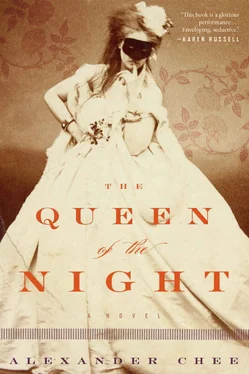After so much time spent wishing myself away, I now longed for my own return.
I contended for the affections of the pianist with no less than the famous beauty I assisted in being a famous beauty. I could not compete for him, not like this.
That moment in the music room, it was pure chance; it was not to be repeated. Most likely, I would never see him again, but what’s more, I was too ashamed to let him see me one more time.
And so when Eugénie returned finally, it was very easy to keep my eyes from her, very easy to be just what she thought I was. Easy to put her gown away quickly before going to bed myself.
Timid, bold, timid. The timidity in me, so like that in the Chopin, seemed permanent, the mazurka a false mirror for my feelings, leaving me unaware of the movement rising in me next.
§
I stood in the spare palace apartment where the Empress’s dresses were now kept before and after she wore them. It had been commandeered after a guest had complained of the drafts and was moved to other quarters; the chamberlain had said he was sure it was to prevent the man’s wife from being seduced by the writer Théophile Gautier, who was said to be writing her a poem every day.
The draft is from him opening the door to deliver his poems, no doubt, he said.
I batted my hand and, sure enough, felt no draft. The pink brocade walls, if anything, helped keep these rooms warmer, though all of Compiègne, I had learned, was famously drafty.
The apartment being unoccupied, if also in use, was something most of the staff had taken advantage of thus far; one girl had brought a lover in here and dressed herself in the gown in which Eugénie had received the week’s guests. It was thought to be the Prince Napoléon himself who’d had her there, though she refused to say. When she told us this, another girl said, Well, you’re the picture of Her Majesty from behind, and then laughed shrilly until she was slapped by the offended grisette.
The lovers aside, the part of the story that stayed with me most was the idea of her wearing the Empress’s dress.
The Empress had just left for the hunt in her emerald-green riding costume, the green tricornered hat pinned to her head, which I knew she meant to look rakish. The palace was emptied of guests and we had a few hours of peace without them. I took off the palace uniform, folded it carefully in a place where only I would find it, and drew out the gown she had worn to the first ball, the gown she had worn to dance to his music. Rose-petal pink and white, the skirt and cuffs were covered in black lace that rose to a strange, witchy black lace collar, unearthly in its beauty.
I stood quietly, mesmerized by it, holding it up in front of me. I then reached behind myself and began to unbutton my dress, working quickly until I was naked. I put my feet into the shoes she’d worn, of the same pink, with black trim and black heels, and then threw the dress aloft as I went underneath it, pulling it over my head. It was like crawling into a tent. Her scent was still in the bodice. I found I could button and lace most of it myself, and while the dress bagged a bit on me, in the mirror I looked a little like what I remembered myself looking like at the Majeurs-Plaisirs. I had thrown myself to the floor in front of the mirror in a mock grand curtsy, pressing my head into the skirt, when I heard the door to the apartment open.
I stayed on the floor, unmoving.
A voice called out the name of the girl who’d been had here. It came closer and closer. Soon the caller was standing over me, and he laughed.
I looked up at my discoverer. I already knew him.
The tenor was a handsome man of fair complexion, but this day he was painted purple, as if to resemble a Negro; the effect was to make him look like neither race, but like something else, a demon. I did not recognize him in the first instant, then, but in the second. He wore his typical evening dress coat and the tight white pants the Empress favored. Though the style favored only a few, it favored him.
We stared at each other openly.
He likewise did not recognize me in the first instant, but on the second one; and when he did, he swore viciously in German before striding quickly to my side and gripping both my arms tightly, pulling me to my feet as he stared into my eyes.
Dead, they said to me. Dead! I begged them to release your body to me and they said it had already been taken to the rue d’Enfer. I came with money for your bond and they told me you were dead and I went and threw it at any beggar I found along the Seine! I then went to a church and prayed for your coward’s soul. I! I prayed for you. I wept for you as I did so. Do you know whom I have prayed for in this life? You don’t even deserve to know this.
His speech was the more terrifying for his monstrous appearance, and yet I could not run.
All the while, I knew it couldn’t have been you who died, he said. They told me you’d been beaten to death and received no treatment for having not described your injuries. I had seen the police take you away; I knew you did not resist them.
He threw me to the floor. I did not cry out — I could not even breathe to see him.
I should beat you to death now. He raised a hand, and then it stayed up, like a lost thought.
I was the one who had faked my death, and yet here I was surprised to see him alive. That the tenor, currently at the Paris Opera, would be invited to Compiègne, this had never occurred to me but, of course, it was him; there could be no one else.
I could pull you from here now by your hair and insist the sheriff of Compiègne help me. You still belong to me.
I had moved not at all but seemed to watch from inside my eyes, though I did not look at him.
He stepped closer and stood over me as he opened his coat, and then I saw my ruby rose, worn there on the inside of his jacket, facing in over his heart.
I kept it, he said. I kept it to remember you. Along with all your shabby little things.
I saw his eyes then, the raw, angry wound of them. He held out his hand, and I flinched until I saw he waited to help me up.
And just like that, his eyes had closed up again, the terrible fire in them gone.
I stood and he circled me, taking me in. He pulled at his cuffs. I am here to perform Othello, he said. Thus my appearance. Why are you here, dressed this way? Is the Empress lending you one of her gowns? Are you… is it possible you’re a guest?
I nodded. It seemed to me it might protect me if he believed it. To think somewhere in the palace another, more powerful man waited for me. But I did not want to speak to him if I could avoid it; to do so seemed like breaking another promise — to the girl whose place I’d taken, or to God, my mother — I did not know. An affront somehow to my renewed mission.
Well, the pleasure at our reunion is entirely mine then, he said.
I smiled, turning my chin in toward my shoulder, still afraid.
Perhaps it would amuse you, he said, if you came to see our dress rehearsal.
He went behind me and pulled the dress taut, his hands on my waist and back. He settled my hair, his fingers brushing the skin of my shoulders. I felt a shock at the familiar touch.
Like this, he said. You are a maiden; she is a matron. It should fit like this.
I nodded.
He reached out expertly to a hat pin near us on the vanity. He took it and slid it through the thick fold of silk at my back, and I nearly fainted as it passed through.
Well, he said. You’ve still barely a figure. I’m sure Her Majesty keeps slim, but you are a knife.
I stood still, held in place as much by all of this as by his hands, and allowed him to continue to pin the gown in place.
You’re no guest here, he then said. I know this, for I am one. I’ve not seen you once at dinner. How is it you are here? Or does someone keep you in their chambers for their own pleasure? Is it the Duke? The Prince Napoléon? Who is it?
Читать дальше












